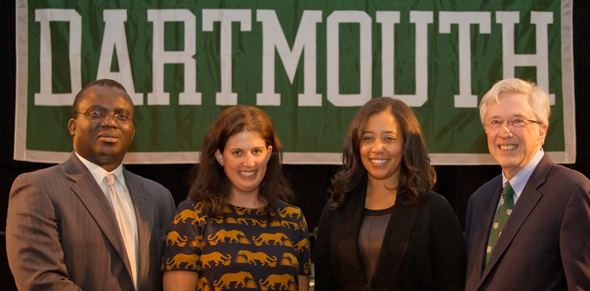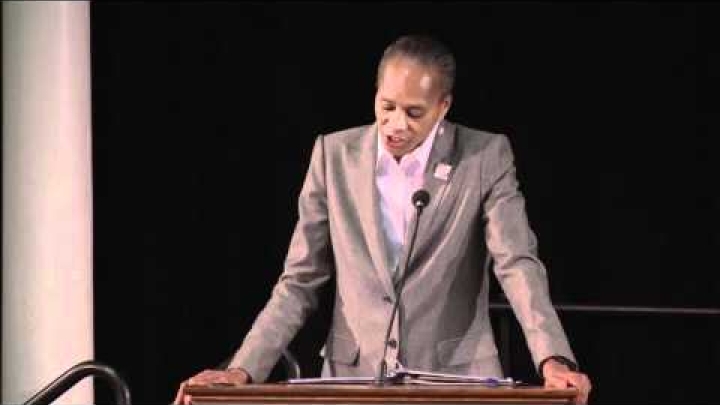
The 2012 Social Justice Award winners, from left: Chidi C. Achebe, DMS ’96; Rebecca M. Heller ’05; Jessica R. Lawson ’04; and Michael W. Mascari ’65. (photo by Eli Burak ’00)
Now the self-assured leader of a foundation that empowers girls in the Dominican Republic, Jessica Lawson ’04 admits that she didn’t start out with confidence and conviction.
When she first visited the impoverished areas in the country, she says, “I was horrified, I was scared, I didn’t know what I was going to do. There were so many problems. But you start to notice that you just have to pick one thing and go with it and never doubt that that one thing can have a ripple effect and make a big difference.”
Lawson was among four alumni and a student group—Students for Africa—honored by Dartmouth with 2012 Martin Luther King Jr. Social Justice Awards, part of the College’s annual celebration of Martin Luther King Jr. At the ceremony last month, the alumni honorees spoke candidly about what inspires them to devote their lives to helping others. Excerpts from their remarks follow below.
At the ceremony, President Jim Yong Kim remarked, “I am asking myself every day, are we doing enough to prepare our students to tackle the world’s troubles in a way that is as impressive and awe-inspiring as our honorees today. … And every year when we honor our alumni who have done such extraordinary work I am convinced that we’re on the right path.”
Chidi C. Achebe, DMS ’96Ongoing Commitment AwardAchebe is president and CEO of the Harvard Street Neighborhood Health Center, which provides preventative and clinical care to underserved families and children in Boston communities including North Dorchester, Mattapan, and Roxbury.
“The health care problem is not just a U.S. problem, it’s worldwide problem. … You should care that 50 million Americans don’t have insurance. … It is in our vital interest that every American is healthy.”
“Working in the arena of social justice is not always very clean or comfortable. … I took a job to turn around a hopelessly situated health center that was bankrupt. … The thing that kept me going every day is I would wake up and think of the 53,000 patients who have nowhere else to go.”
“The first thing we did was to gather some of the smartest people that I could convince to take a cut in their salaries and come and work for a community health center… We achieved that and I think that the board that we have now is absolutely superb.”
“My calling on earth is to serve others.”
Rebecca M. Heller ’05Emerging Leadership AwardAs director and co-founder of the Iraqi Refugee Assistance Project, Heller provides direct legal aid to refugees overseas applying for resettlement in the U.S., Canada, and other countries.
“In going to law school I feel like I made the choice to work from inside the system. I have like six lawsuits pending against the Department of Homeland Security but they’re all within a legal system that I am not fighting in a broad sense, however unjust I personally may think that it is.”
“A really difficult thing to do is, as you grow up you realize your focus has to narrow. … There’s a lot of things that need to change—disability rights, women’s empowerment, access to public health, immigration law—all of these things need people to take the lead, and to make them change, and in the end you’ll stumble into something or pick something compelling for you and that’ll be your issue.”
“You won’t be able to change all of it, and that will be a hard thing to come to grips with.”
Jessica R. Lawson ’04Emerging Leadership AwardLawson is co-founder and associate director of The Mariposa DR Foundation, a community-run organization that works to develop solutions to alleviate extreme poverty in the Dominican Republic, with a focus on empowering girls.
“Across the world, girls living in poverty are often thought of as a problem. They are the most undervalued, underserved, neglected population on earth, but they have the unique power to change things because they are going to be the future mothers, the future care-takers of the children, so investing that time, that energy, that attention in them is what I believe is going to change things.”
“One thing that I did learn at Dartmouth was that this place is not necessarily about getting a good education and going out there and getting yourself a great job. What it taught me was how to prepare myself with the skills the knowledge and the confidence and to recognize opportunity and to seize it.”
Michael W. Mascari ’65The Lester B. Granger ’18 Award for Lifetime Achievement, presented by the Tucker FoundationMascari is executive director of AHRC Nassau and Affiliates, an agency that provides support to more than 4,000 children and adults with intellectual and developmental disabilities in Long Island, N.Y.
“I graduated with the sense that a Dartmouth education does bring with it a sense of obligation and responsibility to use one’s education and talents, whatever they might be, to make a difference in the lives of others.”
“I’ve learned some of life’s most important lessons from people who have limited capacity to read or write or even to speak. Nonetheless they have enormous ability to teach others how to be compassionate, to appreciate one’s friends and families, to overcome challenges, and to live life in the moment.”
“I count as my partners those family members who have devoted their lives and sacrificed their careers not only to care for their own son or daughter with a severe disability, but to make the world a better place for every parent and person with a disability.”
